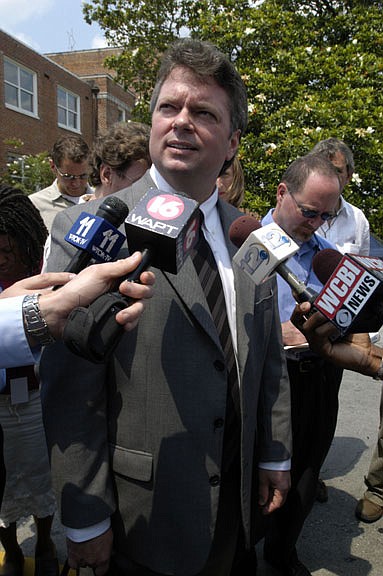Attorney General Jim Hood backed away from Gov. Haley Barbour's request to defend his plan to tax the hospitals in Hinds County Chancery Court. Kate Medley
Wednesday, August 27, 2008
Mississippi Attorney General Jim Hood says he will not defend Gov. Haley Barbour in a Hinds County Chancery Court case, saying his defense would conflict with other branches of government. Forty three hospitals have sued Barbour and the Division of Medicaid for injunctive relief, declaring Barbour's plan to introduce a hospital tax to fill a $90 million Medicaid shortfall unconstitutional.
"[W]e must ensure that the claims made by one branch of government do not violate the powers of the other two branches," Hood told the Jackson Free Press, refusing to offer details on the nature of the violations. "We will wait for those specific claims to be made before a judge and then we will be in a position to comment further."
Barbour disputed the conflict. "Neither the legislative nor judicial branches are parties to the lawsuit, so it is absurd for Jim Hood to suggest some sort of conflict as his reason for begging off the case," Barbour said in a statement.
"Good lawyers do not turn their backs on their clients at the last minute. But this is not the first time Attorney General Hood has done so since I've been governor. It is a shame the taxpayers of Mississippi will have to pay extra to be represented because Jim Hood has changed his mind again about who he represents."
Attorney Steve Thomas of Bradley, Arant, Rose & White LLP will represent Barbour's plan in court, now that Hood has dropped his defense. Barbour did not return phone calls.
Hinds County Chancery Judge William Singletary ruled last month that Barbour's initial plan to raise hospital fees would bypass the Legislature's sole right to raise taxes. Barbour argues that his new plan, released in August, falls short of the tax-hike definition and thus requires no legislative decision. He still contends that the fee hike is no different from an earlier fee on state hospitals that was abandoned a few years ago after the federal government rejected itand that the hospitals were fine with the fee then.
Rep. Cecil Brown, D-Jackson, would not comment on the possible conflict of interest Hood's defense of the governor would pose to the Legislature, but said he remained dubious of the governor's new plan, saying the Legislature should ultimately be making the call on a tax increase, not the governor.
"It's a tax hike, no matter how Barbour tries to define it, and tax hikes fall to the Legislature," Brown said, adding that he did not personally believe Barbour's plan would work.
"It's not the same old tax the hospitals had been paying, (but) revised. It's worse," Brown said. "It will mean windfall profits for some hospitals and closed doors on others. Some of the smaller hospitals will get windfall payments, while other hospitals will be choked to death. It makes absolutely no sense at all."
The Mississippi Hospital Association had endorsed an earlier version of Barbour's hospital tax during the 2008 legislative session, as well as a House hybrid plan consisting of a lesser hospital tax increase coupled with a modest 50-cent tobacco tax. But MHA sent an Aug. 21 letter to legislators rejecting Barbour's new plan, disputing his claims of the plan being a "fair, permanent, sustainable solution."
"Under the governor's plan, one 48-bed hospital nets $19.6 million, while a 623-bed hospital nets $6.2 million. How is that 'fair'? Under the governor's plan, one hospital will actually pay the Division of Medicaid $47,563 per year to treat Medicaid patients while another hospital (which provides only $200,000 per year in Medicaid services) will net $3.4 million," Wrote MHA President Sam Cameron. "... One hospital will be paid less than $400 per patient day (down from its current rate of $1,200), while another hospital will be paid $26,619 per day! How is that 'fair?Ҕ
Cameron said in the letter that he personally knew of two hospitals "that will begin closing their doors on the plan's Sept. 1 effective date."
"The 'bottom-line' of this comparison is that 87 of the state's 116 hospitals will receive less money under the governor's plan than under the House Hybrid version," he wrote.
Singletary will hear arguments from both sides regarding the new plan Aug. 27 at 10 a.m.

Comments
Use the comment form below to begin a discussion about this content.
Sign in to comment
Or login with:
OpenID